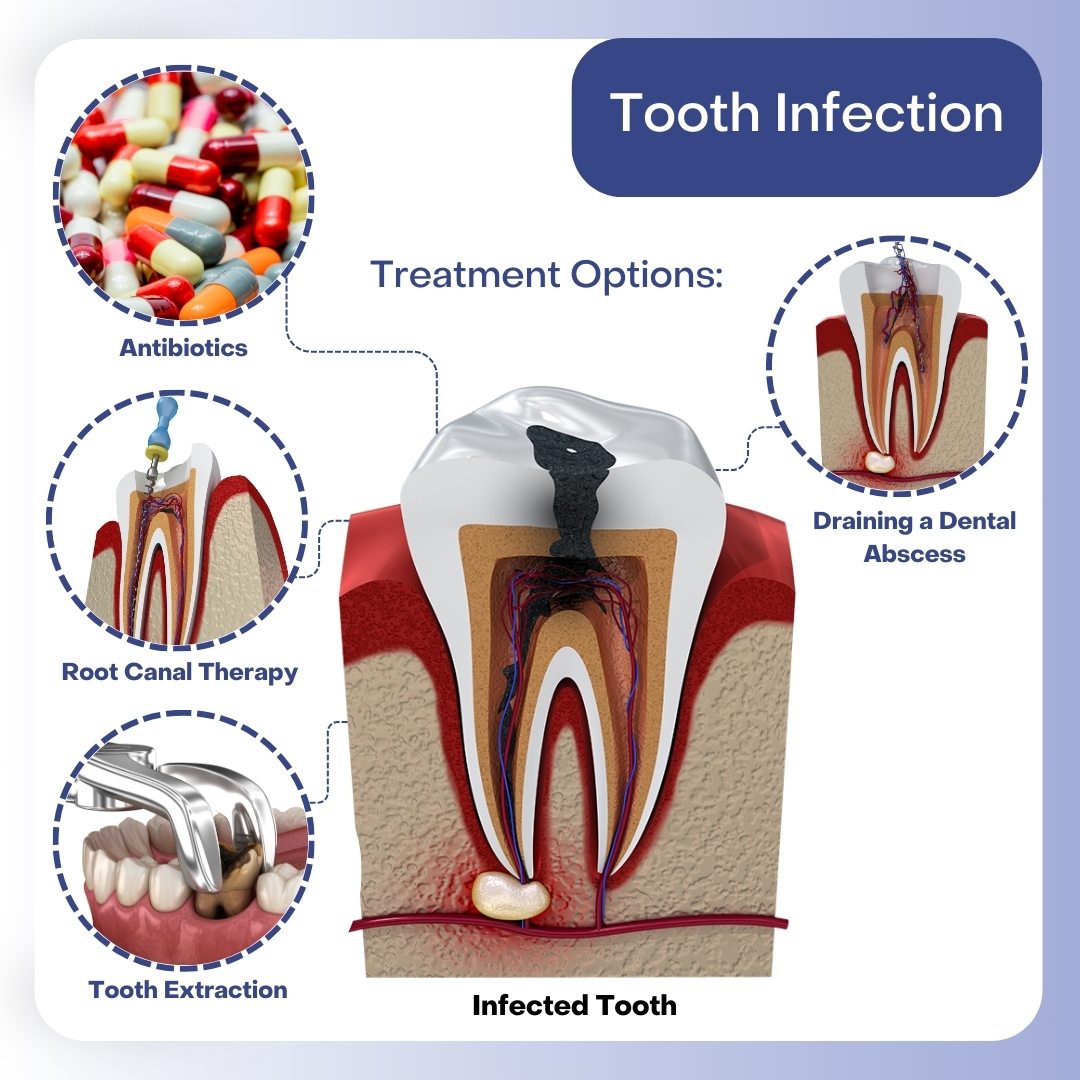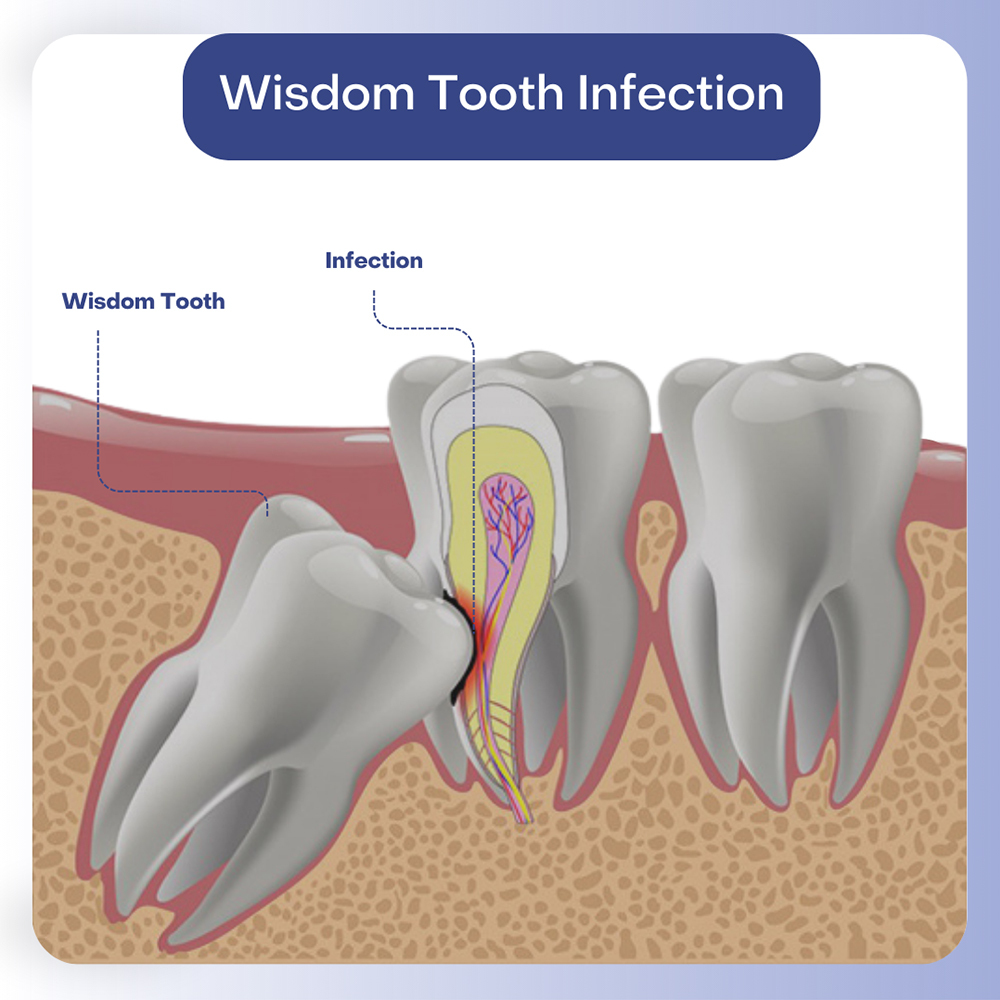Table of contents
 A tooth infection occurs when bacteria in your mouth can enter the tooth. Teeth have three different layers; the outer layer is tooth enamel, which is extremely hard. Underneath the enamel is a layer of dentin, a softer material more easily destroyed by bacteria. The dental pulp is right in the center and is a collection of soft tissues, including the nerve.
A tooth infection occurs when bacteria in your mouth can enter the tooth. Teeth have three different layers; the outer layer is tooth enamel, which is extremely hard. Underneath the enamel is a layer of dentin, a softer material more easily destroyed by bacteria. The dental pulp is right in the center and is a collection of soft tissues, including the nerve.
Bacteria can enter a tooth through a dental procedure or trauma. Often, it is the result of tooth decay. The infection is initially confined to the tooth but can spread to the surrounding tissues without treatment. In the worst case, it can cause a dental abscess or become life-threatening.
One of the first signs of an infection is a throbbing, continuous, or sharp pain. Sometimes, it may only be present when you chew on the affected tooth. If you don’t get treatment, the pain can spread, so you may notice swollen gums around the tooth, facial swelling, and difficulty chewing, and the pain can affect your jawbone. It can cause swollen neck glands and even a fever, and at this stage, it can indicate the infection is spreading.
A dental abscess can cause a pimple on the gum where pus is building up.
Several options are available depending on the extent of the infection. They include the following.
Antibiotics may be prescribed to eliminate the bacteria causing the infection and prevent it from spreading.
Root canal treatments can be used if you have a root canal infection, where the bacteria have traveled from the dental pulp into the root canals. Treatment can be very successful when the infection is confined to the tooth and roots.
The dental pulp is removed during root canal therapy, and the root canals are thoroughly cleaned before the tooth is permanently sealed. It is then restored with a dental crown.
If you have a dental abscess, our dentist will make a small incision into the pimple and may insert a tiny drain to help the infection drain out. Afterward, the area is cleaned with saline.
When a tooth is abscessed, it must often be extracted, even if the abscess has already been drained. We will only suggest this treatment if there is no other option.
Promptly treating a tooth infection is vital, especially if you notice more serious symptoms like fever or facial swelling. If you are concerned about an infected tooth, please get in touch with My New Jersey Dentist for emergency dentistry and immediate advice over the phone.
 A wisdom tooth infection is a common problem. Usually, the jaw isn’t large enough to accommodate four large molar teeth that only appear in the late teens or early 20s when the rest of the adult teeth are firmly established.
A wisdom tooth infection is a common problem. Usually, the jaw isn’t large enough to accommodate four large molar teeth that only appear in the late teens or early 20s when the rest of the adult teeth are firmly established.
As a result, wisdom teeth have trouble erupting properly and may try to come up underneath neighboring teeth, partially emerge and remain partly covered with gum tissue, or push against neighboring teeth. All risk the wisdom tooth becoming infected.
A wisdom tooth infection can cause similar signs to any other tooth infection. These include:
Like a severe tooth infection, a wisdom tooth infection can result in a fever and swollen lymph glands and need urgent treatment.
There are various causes of an infection in the wisdom tooth, including the following.
When a wisdom tooth only partly emerges through the gum or comes through at an angle, it is referred to as being impacted. A partially erupted tooth is more susceptible to infection since food debris and dental plaque can build up around it.
The location of wisdom teeth right at the back of the mouth can make them trickier to keep clean. It can be especially difficult to floss around wisdom teeth. Consequently, these teeth are more likely to develop cavities.
Treatment depends on how badly the tooth is infected. Our dentist will thoroughly clean the affected wisdom tooth. You may be given antibiotics to treat the infection, but it must almost certainly be extracted.
Extracting infected wisdom teeth helps prevent further infections and damage to nearby teeth, gum tissue, and jawbone.
Because bacteria generally cause a tooth infection, then the answer is yes. Good oral care helps control the number of bacteria in your mouth, removing them before they cause infection and inflammation.
Regular dental checkups allow our periodontist to detect any signs of cavities or other problems that could result in painful infections. We monitor the location of wisdom teeth that have yet to erupt, so if they are impacted or likely to become infected, we can remove them before this happens.
Tooth infections may be common, but people often delay seeking prompt dental care. They may wait until the pain becomes severe or they develop other symptoms. When this occurs, they may need emergency dental care. When emergency dentistry is needed, the chances of needing a tooth extraction can increase.

My name is Victoria Kushensky. I am a general dentist dedicated to remaining at the forefront of my field. Combining compassionate care with extensive knowledge, I offer cosmetic and general dentistry services as well as advanced root canal treatments.
I earned my Doctor of Dental Surgery (DDS) degree from the esteemed New York University College of Dentistry. Throughout my career, I have honed my skills in various dental procedures, ensuring effective treatment for each patient’s unique needs. I prioritize patient comfort and understanding, taking the time to thoroughly explain procedures and address any questions.
More about Dr. KushenskyMy NJ Dentist: Victoria Kushensky, DDS
385 Prospect Ave Suite 304
Hackensack, NJ 07601
(201) 298-8000